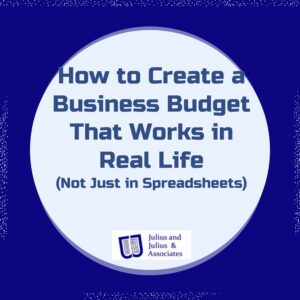
Ever built a beautifully colour-coded budget, that no one looked at after month one? You’re not alone.
A powerful business budget isn’t just a spreadsheet, it’s a financial playbook.
Here’s how to build one that breathes, adapts, and actually gets used:
💡 1. Start with reality, not optimism
It’s tempting to inflate revenue projections or downplay costs, especially when you’re passionate about your growth. But great budgets are built from ground truth, not best-case scenarios. Look at last year’s actuals. Consider seasonal slow periods. Add a margin for those “surprise” costs like insurance spikes, tech upgrades, staff turnover. Honesty here creates confidence later.
🎯 2. Link it to your goals (not just your bills)
Budgets aren’t just about cutting costs, they’re about enabling growth. Whether you’re hiring, launching a new service, or aiming to reduce debt, your budget should reflect your strategy. That means allocating resources to what matters most, your long-term priorities, not just this month’s invoice pile.
🔁 3. Review monthly and adjust ruthlessly
A static budget is just a wish list. Real budgeting means course-correcting as you go. We advise clients to review financial performance each month against their budget. What outperformed? What underdelivered? Did a new supplier raise costs? Don’t be afraid to shift resources or tweak forecasts. Agility is financial strength.
👥 4. Involve the team behind the numbers
This one is often overlooked. Finance doesn’t happen in a vacuum. Your sales team forecasts income. Your admin team handles suppliers. Your care staff manage payroll hours. Including them in budgeting not only improves accuracy, it boosts ownership. And that leads to better financial decisions across the board.
🧾 5. Keep it simple and actionable
A good budget fits on one screen and is instantly understandable. Focus on the big four: revenue streams, fixed and variable costs, cash flow, and profit margin. Ditch the jargon. Ditch the 27-tab spreadsheet. If your team can’t understand it, they can’t execute it.
The bottom line? A great budget is a decision-making tool, not a compliance chore. And when it’s done right, it creates confidence, not confusion.
Leave a Reply